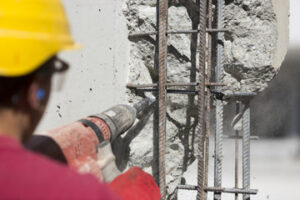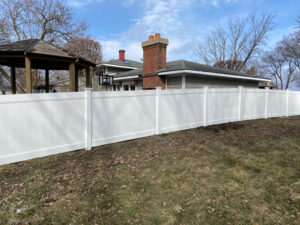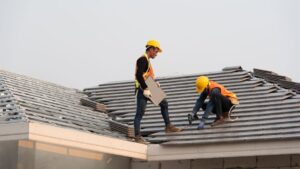Power washing services clean your property of debris, dirt, mildew, mold, spider webs and chipped paint. It’s an important part of home maintenance that should be done at least once a year.

Having a professionally cleaned exterior can help you avoid costly repairs and keep your home looking beautiful. Visit https://www.certifiedsoftwash.ca/ for more information.
In a world that emphasizes first impressions, it’s essential to make your property’s exterior shine. Aside from making a great impression on guests and passersby, a clean exterior protects your property against long-term damage and enhances its aesthetic value. Power washing is a quick and efficient way to revitalize your driveways, sidewalks, walkways, facades, decks, patios, and more, eliminating stubborn stains, mildew, mold, and other grime.
In 2025, the emphasis on curb appeal will likely continue to evolve into a critical factor for homeowners and real estate buyers alike. Studies show that properties with a well-maintained exterior often sell faster and at higher prices, and regular power washing helps prevent surface degradation by removing stains, mildew, and other debris.
With a range of cleaning solutions tailored for different surfaces around your home, power washing is the ideal way to boost your curb appeal and protect against long-term damage. Power washing services can also refresh your gutters and downspouts, preventing blockages, leaks, and water damage. Additionally, soft washing techniques can be used to remove moss and other growth from your roof, extending its lifespan and protecting against water damage.
Aside from the monetary benefits of boosting curb appeal, there are other benefits to investing in professional Power Washing Services. These include improved safety, a healthier living environment, and increased property value.
The most important factor to consider when determining whether or not Power Washing Services are right for you is understanding the impact of these services on various surfaces. For example, while power washing services are an effective way to restore a variety of surfaces to their original appearance, using these methods on delicate surfaces like vinyl siding or stucco could damage the material.
When selecting a Power Washing Service provider, look for a local company that specializes in the type of surface you wish to clean. This will help ensure that the process is completed correctly and safely, preserving the life of your surfaces and ensuring a quality result. Speak with your Neighborly home service professional for more information about Power Washing and other exterior cleaning services in your area.
Prevents Damage
Power washing is a vital part of ongoing property maintenance, protecting surfaces from unforeseen damage and mitigating the negative effects of environmental factors. From dirt and moss to mildew and mold, organic growth degrades exterior surfaces over time, leading to cracks, wood rot, and health issues from spores released into the air.
Regular power washing removes these harmful contaminants, extending the life of surfaces and improving overall visual appeal. Additionally, incorporating this process into an ongoing maintenance routine helps maintain the integrity of a home’s structure and supports its value in the real estate market.
Unlike chemical cleaning solutions, power washing utilizes pressurized water to remove stubborn stains. This allows for a more thorough clean without the potential risk of damage to delicate exterior elements, such as windows or screen doors. This makes it an ideal option for cleaning pavers, concrete, wood, vinyl siding, and other hard-to-reach areas of a home or business.
Professionals are trained to use the appropriate pressure settings and nozzles to ensure that surfaces are cleaned effectively without damaging them. For example, soft woods or painted surfaces require lower pressure than concrete, while removing tough stains requires more force. Additionally, experts know to avoid spraying delicate landscaping or shrubs, as well as to select detergents that are safe for the environment and surfaces being washed.
Aside from enhancing curb appeal and preventing damage, power washing can improve allergy symptoms by removing debris, mildew, and mold from outdoor living spaces. For homeowners considering repainting their homes, a power wash is also recommended to ensure the new coat of paint sticks properly and lasts longer.
Finally, a power wash can help enhance safety by eliminating slippery surfaces caused by moss and algae, as well as chipped or fallen leaves, branches, and other debris. This prevents falls and other accidents, while also making a property more appealing to visitors and potential buyers. In an era where aesthetics and safety are highly valued, Power Washing Services are a wise investment for homeowners and commercial property owners alike.
Health
Power washing eliminates contaminants that can cause long-term damage to your property. It also extends the life of your surfaces by preventing premature wear and tear. Regular powerwashing helps you save money on costly repairs and maintenance. In addition, it enhances safety by eliminating mold, mildew, algae, and other harmful substances that can aggravate allergies and respiratory problems. Powerwashing services also remove slippery substances that pose a slip and fall risk.
Whether you’re a homeowner, business owner, or property manager, Power Washing Services can help you make your property look its best. Professionally cleaned exteriors boost curb appeal, enhancing the appearance of your home or commercial building and providing a great first impression.
Over time, dirt, grime, mold, and mildew can accumulate on exterior surfaces such as siding, decks, driveways, and sidewalks, causing them to look dull and unattractive. By using high-pressure water, Power washing services can eliminate these contaminants, restoring exterior surfaces to their original bright and vibrant appearance. This instantly enhances your home’s curb appeal, making it more attractive to potential buyers if you plan to sell your home.
Commercial Power washing services can be used on a wide variety of outdoor surfaces, including driveways, parking lots, patios, sidewalks, and rooftops. They are also effective in removing oil and grease stains, as well as other contaminants that can damage concrete and wood. In addition, a power washing service can be used on roofs and gutters to remove black streaks caused by debris and weather conditions.
When hiring a Power Washing service, it’s important to choose an experienced contractor with the proper equipment and knowledge of how to safely and effectively clean different types of surfaces. A reputable company will use the correct pressure and nozzles to avoid damaging your property. They will also test the surface before washing it to ensure that it can withstand the pressure and is free of any damage. In addition, they will use environmentally friendly detergents and cleaning solutions that are safe for the environment and your family’s health. Lastly, they will use proper technique and maintain a consistent distance to prevent damage to delicate surfaces such as windows, siding, and plants.
Safety
Power washing is an effective and safe cleaning method that can be used on various surfaces of your property, including exterior walls, windows, roofs, and pavements. It is also a good choice for removing harmful substances that accumulate on outdoor surfaces, such as mildew and mold, which can contribute to slipperiness and respiratory problems. Regular power washing can help protect your building’s materials and extend its lifespan.
However, it is essential to understand the safety risks involved in using power washers and take precautionary measures when doing so. Power washing involves high-pressure water streams that can cause severe injuries if not handled properly. It is therefore important to follow safety guidelines and avoid pointing the nozzle at anyone or anything. For example, it is crucial not to point the nozzle at fragile objects such as plants, bricks, or old mortar because they can be damaged by the water stream. It is also advisable to wear protective clothing and use an appropriate cleaning solution.
Professional power washing services use the right equipment and techniques to safely remove contaminants without causing damage. They use adjustable pressure and nozzle settings to suit the specific surface being cleaned, ensuring a thorough clean without causing any unnecessary harm. This approach helps prevent costly repairs and maintenance due to accidental damage. For instance, using too high a pressure on wood or concrete surfaces can strip them of their texture or cause cracking.
Moreover, professional contractors ensure that the surrounding areas are free of obstructions before starting the cleaning process. They will also cover or move any fragile items to prevent them from being exposed to the high-pressure spray of the power washer. Lastly, they will advise you to keep children and pets indoors during the power washing process as the jet of water and chemicals can ricochet and cause injury.
Power washing is an effective and affordable cleaning solution that can extend the lifespan of your home’s surfaces and improve its curb appeal. It can also be used on commercial properties to protect their investment and attract customers. However, many people are misinformed about power washing and the potential dangers it poses to their health, the environment, and the surrounding surfaces. Dispelling these misconceptions will enable individuals to safely and effectively power wash their homes and businesses while protecting the surrounding environment.




